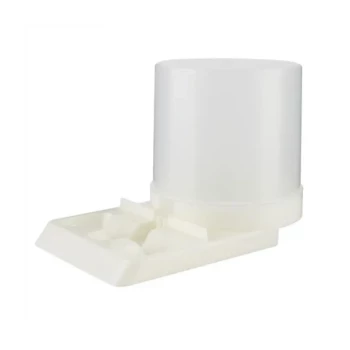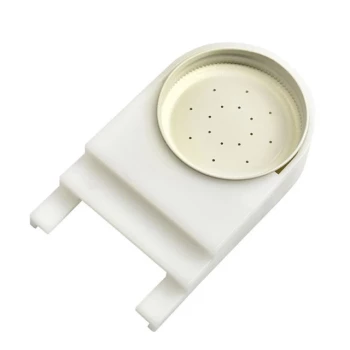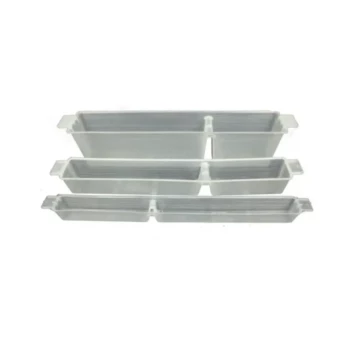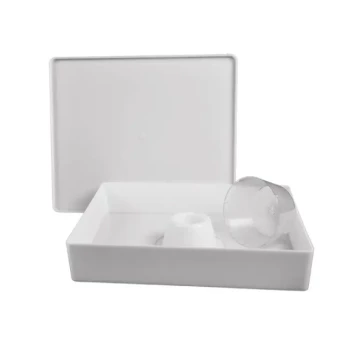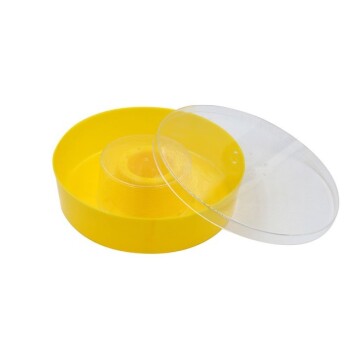For a honey bee colony, pollen is the sole natural source of protein, fats, vitamins, and minerals. While nectar and honey provide carbohydrates for energy, pollen delivers all the other essential nutrients required for raising new bees and ensuring the health of young workers. It is the "growth food" that sustains the colony's life cycle.
While honey provides the fuel for daily work, pollen provides the fundamental building blocks for life itself. A colony's ability to grow, reproduce, and defend itself is directly dependent on a consistent and high-quality supply of pollen.
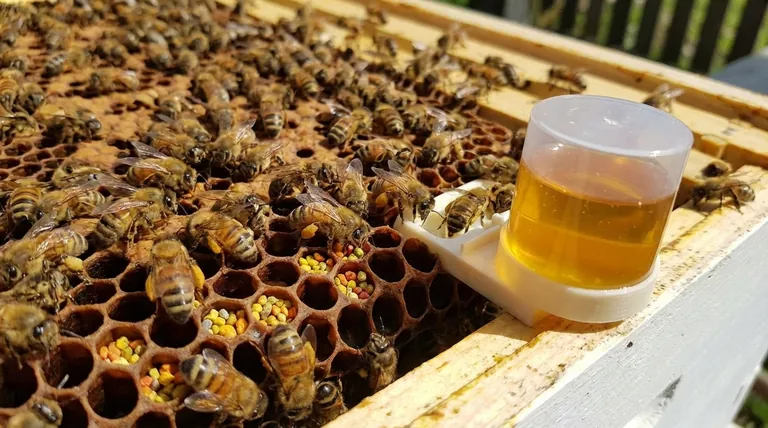
The Dual-Diet System: Pollen vs. Honey
To understand a colony's health, you must first distinguish between its two primary food sources. They serve entirely different, yet complementary, purposes.
Honey: The Colony's Fuel Source
Honey is processed nectar. It is almost pure carbohydrate, composed of simple sugars like fructose and glucose.
This high-energy food powers the daily activities of the colony, such as foraging for food, regulating the hive temperature, and defending the nest. It is the gasoline that keeps the engine running.
Pollen: The Colony's Growth Engine
Pollen is often mixed with nectar or honey and stored in cells, where it ferments into a substance called "bee bread."
This bee bread is the colony's complete food source for everything beyond simple energy. It is the engine oil, steel, and wiring needed to build and maintain the machine.
A Detailed Look at Pollen's Nutritional Profile
Pollen's nutritional value is complex. The exact composition varies by plant source, but it always provides the same essential categories of nutrients that bees cannot get from honey.
Protein and Essential Amino Acids
This is pollen's most critical contribution. Proteins are the building blocks for all body tissue, including muscles, organs, and glands.
Bees require 10 specific amino acids from their diet, all of which are found in pollen. These are essential for the rapid growth of larvae and the development of young adult bees.
Lipids (Fats) and Sterols
Lipids are vital for building cell membranes and serve as a long-term energy reserve.
Critically, pollen supplies sterols, which bees cannot synthesize on their own. Sterols are necessary for producing key hormones that regulate growth, molting, and development.
Vitamins and Minerals
Pollen contains a wide range of vitamins (like B-complex and C) and minerals (like potassium, calcium, and magnesium).
These micronutrients act as catalysts for countless metabolic processes, support immune function, and are essential for overall bee health, much like they are for humans.
Who in the Colony Depends on Pollen?
While all bees benefit from pollen, consumption is not distributed equally. The colony directs this precious resource to where it is needed most.
Developing Larvae
A larva must increase its body weight by over 1,500 times in just six days. This incredible growth is fueled almost exclusively by a diet of bee bread.
A shortage of pollen, known as a "pollen dearth," will cause the colony to slow or stop raising new brood, as they cannot support the larvae's developmental needs.
Young "Nurse" Bees
Young adult bees, typically in the first one to two weeks of their life, are the colony's "nurses." They consume vast quantities of pollen to develop their hypopharyngeal glands.
These glands produce the protein-rich royal jelly that is fed to the queen, enabling her to lay up to 2,000 eggs per day, and to the youngest larvae in their first few days of life.
The Queen Bee
The queen herself does not eat pollen directly. She is fed a constant diet of royal jelly by her attendants.
However, her productivity is directly tied to the colony's pollen intake. The ability of nurse bees to produce royal jelly is entirely dependent on their own consumption of pollen.
Understanding the Trade-offs: Not All Pollen is Equal
A critical factor that is often overlooked is the quality and diversity of available pollen.
The Problem of Monocultures
A colony foraging in a massive field of a single crop is forced onto a monotonous diet. While this pollen may be abundant, it might be deficient in certain amino acids or lipids.
This is like a human trying to live on a diet of only bread. It provides calories and some protein, but it leads to malnutrition and a weakened immune system over time.
The Power of Floral Diversity
A colony with access to a variety of flowering plants from different species can gather a mix of pollens.
This ensures a complete and balanced nutritional profile, leading to healthier bees, more robust brood development, and greater resistance to diseases and pests.
Making the Right Choice for Bee Health
Understanding pollen's role is key to supporting honey bees and other pollinators.
- If you are a beekeeper: Focus on ensuring your colonies have access to diverse floral forage throughout the season, and consider supplemental feeding with high-quality pollen substitutes during a dearth.
- If you are a gardener or homeowner: Plant a variety of native, pollen-rich flowers that bloom from early spring to late fall to provide a continuous and diverse food source for local pollinators.
- If you are a land manager or farmer: Consider planting pollinator-friendly cover crops or wildflower strips to support the health of the bees that are essential for crop pollination and ecosystem balance.
Ultimately, supporting pollinators means ensuring they have access to the complete nutrition they need to not just survive, but to thrive.
Summary Table:
| Nutrient Category | Key Components | Primary Function for Bees |
|---|---|---|
| Protein & Amino Acids | 10 Essential Amino Acids | Building body tissue, muscles, and glands for larvae and young bees. |
| Lipids (Fats) & Sterols | Sterols, Fats | Building cell membranes, energy reserves, and producing growth hormones. |
| Vitamins & Minerals | B-complex, Vitamin C, Potassium, Calcium, Magnesium | Supporting metabolic processes and immune function for overall bee health. |
Ensure your colonies have the nutrition they need to thrive. HONESTBEE supplies commercial apiaries and beekeeping equipment distributors with high-quality supplies, including nutritional supplements and feeding equipment, to support robust brood development and overall hive health. Contact our wholesale experts today to discuss your apiary's specific needs and build a stronger, more productive operation.
Visual Guide
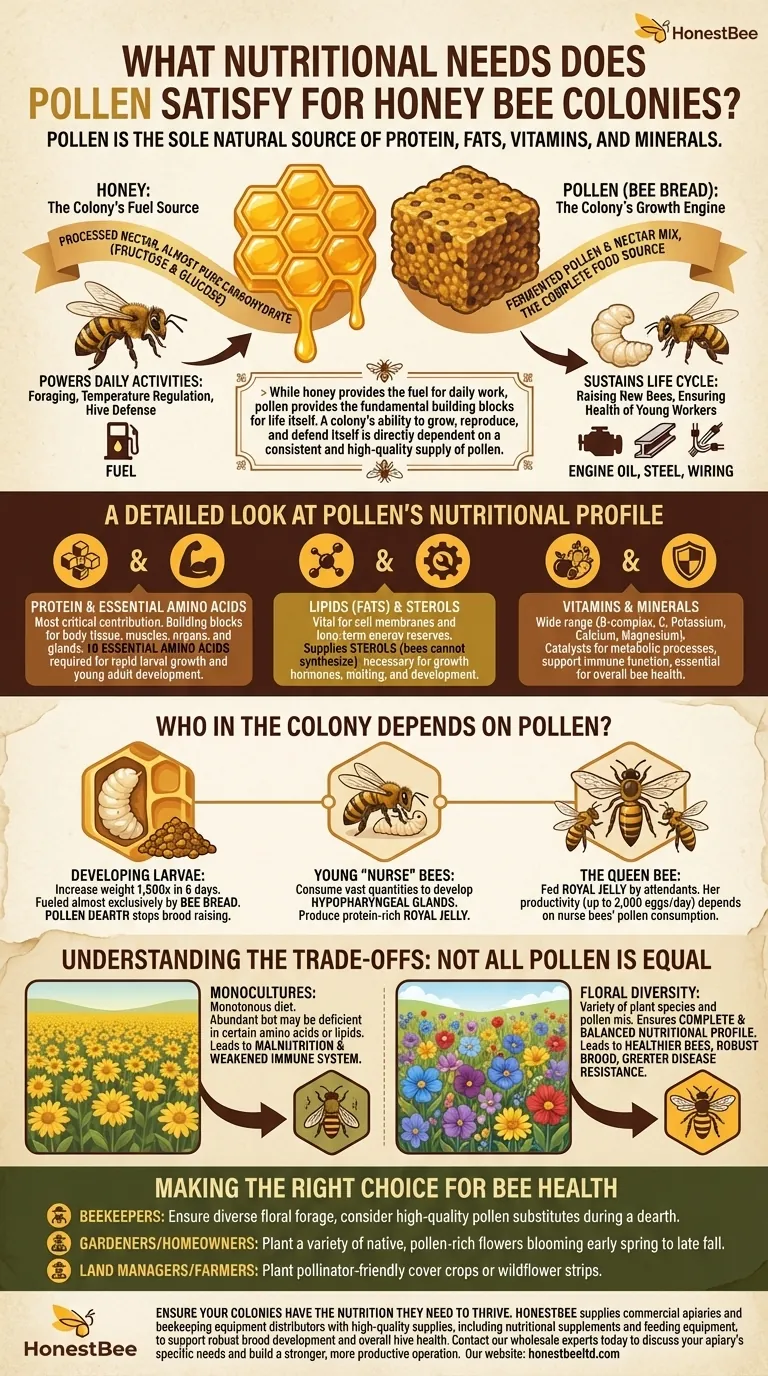
Related Products
- HONESTBEE Entrance Bee Feeder Professional Hive Nutrition Solution for Beekeeping
- Classic Boardman Entrance Bee Feeder Hive Front Feeding Solution
- In-Hive Dual Compartment Frame Bee Feeder for Targeted Colony Nutrition
- HONESTBEE Professional Entrance Bee Feeder Hive Nutrition Solution
- Rapid Bee Feeder White Plastic 2L Round Top Feeder for 8 or 10-Frame Bee Hives
People Also Ask
- What is a bee entrance feeder and what are its drawbacks? Essential Guide to Hive Security and Feeding Efficiency
- What is an entrance feeder and what are its characteristics? Essential Guide for Effortless Hive Feeding
- What are the different types of honey bee feeders? Choose the Right Feeder for Your Hive
- What are the advantages and disadvantages of using an entrance feeder for bees? Balance Convenience and Hive Security.
- How does the entrance feeder method work? A Guide to Simple But Risky Hive Feeding
